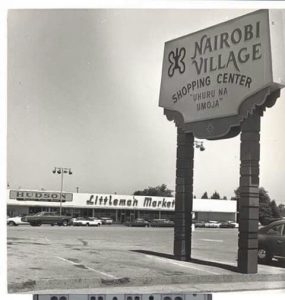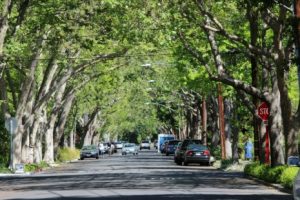Posts Tagged ‘fair housing’
The other side of the freeway
In the bottom drawer of my old black filing cabinet sits a battered cardboard box containing the manuscript of a novel I wrote in the early 1970s. I understand now why it never found a publisher. I was way too new to this country, and way too naïve, to do justice to its thorny subject: racial discrimination in housing. As I reread some of the text, I recalled the shock I felt when I first grasped the magnitude of the social gaps. The descriptions that follow come from my own experience as I researched the book, and it began my involvement with the fair housing movement.
Here is the central character Karen, a newspaper reporter, visiting the black ghetto of East Palo Alto for the first time to interview the director of a community advice center:
She knew vaguely that East Palo Alto belonged to the county. … She crossed the county line now, and accelerated to get onto the overpass that spanned the freeway. As she came down the ramp on the other side, she knew she was in a different country. The road was suddenly pot-holed and bumpy, and brown dust rose in thick choking swirls from its verges. She slowed, and looked about her. Such tiny bedraggled houses, desperately in need of paint. Yards littered with junk, yet here and there a brave attempt at order and color, a flower-bed, a well-cut lawn. She came upon a few tatty shops. Surely this couldn’t be the main shopping center? Yet soon she could see the sign, NAIROBI SHOPPING CENTER, and underneath, in a language she could not understand, UHURU NA UMOJA.
She had to force herself to open the door. Lurid accounts of rapes and muggings and violence in the streets flooded her mind. Here she was the enemy. She wanted to jump back into the car and get out, away from this place.
A woman passed, with two small children, headed for the market. She looked indifferently at Karen as she passed, then turned to scold one of the children, who was whining for candy. Karen let out the breath she had been involuntarily holding, and made herself move on. … Across the road, outside a liquor store, a black knot of middle-aged men stood transfixed in time, waiting for nothing.
It was hot. The dust lifted lazily as she walked. Something about the huge trees, and the stillness of the air, brought to her mind descriptions she had read of towns in the southern states. But this was California. It did not make sense. A mockingbird flashed its wings across her path, still proudly singing.
Karen does her interview, in which she learns about the pressures of living in East Palo Alto (and also finds herself attracted to Paul, the advice center director).
She said goodbye, and walked slowly back to the car, past the Louisiana Soul Food Kitchen and the Black and Tan Barber. The heat and dust were almost unbearable.
Back across the freeway, she noticed for the first time the neatly swinging redwood sign: Welcome to Palo Alto. A few blocks further down University Avenue and it hit her like a punch in the gut. She pulled over to the side of the road and rested her head on the steering wheel, fighting back an impulse to vomit. The contrast was an obscenity. Huge magnolias here lined the street on both sides, giving deep dappled shade to the well-paved highway. Between the road and the white concrete sidewalks rose great greening mounds of juniper and ivy, and beyond them, with manicured lawns and discreet sprinkler systems, were the complacent mansions of the rich.
Two Neighborhoods
In honor of Martin Luther King Day, I pulled out the manuscript of a novel I wrote around the time of his death. I had become involved as a volunteer in fair housing issues and wanted to write about what I was learning. I was a new immigrant to the US, clueless about racial issues in this country; the battered manuscript box has deservedly sat in the bottom drawer of an old filing cabinet ever since.
An incident based on my research for the book has stuck with me, however. The central character, a young woman newspaper reporter, works in Palo Alto, CA and goes to East Palo Alto, a black neighborhood just across the freeway, to interview a community organizer. Here are excerpts from a few paragraphs:
The afternoon was hot, and she was thankful for the shade of the overhanging trees as she drove down University Avenue toward East Palo Alto. She had never been there before. There had been nothing to go for. And she would have felt diffident about going to a black ghetto as a mere sightseer, even if it had occurred to her to do so.
As she came down the ramp on the other side of the freeway, she knew she was in a different country. The road was suddenly potholed and bumpy, and brown dust rose in thick choking swirls from its verges. She slowed and looked about her. Such tiny bedraggled houses, desperately in need of paint. Yards littered with junk, yet here and there a brave attempt at order and color. She came upon a few tatty shops. Surely this couldn’t be the main shopping center? Yet soon she could see the sign, NAIROBI SHOPPING CENTER, and underneath, in a language she could not understand, UHURU NA UMOJA.
Showing the predictable set of fears and prejudices about the African-American people she sees around her, the reporter parks her car and walks to her appointment, during which she is invited to sit in on a fair housing case.
She said goodbye, and walked slowly back to the car, past the Louisiana Soul Food Kitchen and the Black and Tan Barber. The heat and dust were almost unbearable.
Back across the freeway, she noticed for the first time the neatly swinging redwood sign: Welcome to Palo Alto. A few blocks further down University and it hit her like a punch in the gut. She pulled over to the side of the road and rested her head on the steering wheel, fighting back an impulse to vomit. The contrast was an obscenity. Huge magnolias here lined the street on both sides, giving deep dappled shade to the well-paved highway. Between the road and the white concrete sidewalks rose great greening mounds of juniper and ivy, and beyond them, with manicured lawns and discreet sprinkler systems, were the complacent mansions of the rich.

